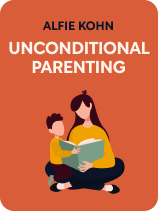

This article is an excerpt from the Shortform book guide to "Unconditional Parenting" by Alfie Kohn. Shortform has the world's best summaries and analyses of books you should be reading.
Like this article? Sign up for a free trial here .
Which parenting skills are potentially harmful to children? How does mainstream advice teach poor parenting skills?
In Alfie Kohn’s book, Unconditional Parenting, he argues that mainstream parenting advice has several potentially damaging effects, even leading to poor self-esteem and depression in children. Kohn’s technique of unconditional parenting aims to make children feel more loved and accepted by their parents.
Read on to find out why society may have taught you poor parenting skills and learn Kohn’s solution.
Does Mainstream Advice Teach You Poor Parenting?
According to Kohn, mainstream parenting advice focuses almost exclusively on discipline: how to use rewards to encourage good behavior and punishments to discourage bad behavior. He argues that even seemingly progressive parenting advice (for example, doling out attention, affection, and praise when you catch your child behaving well or putting a misbehaving child in a time-out) still buys into a poor parenting framework built around rewards and punishments. This framework, he says, is outdated, and it may even be damaging your children.
Parents are often advised to tweak these strategies to make them less damaging, for example by ignoring bad behavior rather than actively punishing it or by praising effort, not ability. But Kohn says this misses the point and teaches poor parenting skills—he encourages parents to break free of the old framework entirely.
In this article, we’ll look at Kohn’s argument for change: how traditional parenting techniques work and why these techniques potentially lead to poor parenting.
| It’s Not Just Parenting: School Grades as Rewards and Punishments The bulk of Unconditional Parenting focuses on parent-child interactions, but Kohn also takes on the education system. He argues that good and bad grades constitute systems of reward and punishment, and as such, they get in the way of children’s natural desire to learn and negatively affect their relationships with their teachers. He also notes in Unconditional Parenting that when parents reward their children for good grades and punish them for bad ones, this multiplies the damage caused. Kohn isn’t the first person to suggest alternatives to grades. In most Montessori schools, for example, teachers hand out progress reports rather than grades for the same reasons. These progress reports include sections on broader areas of development, such as inquisitiveness, desire to explore, and spirit of cooperation, and teachers rate the degree to which children have mastered particular academic skills (for example, beginning, in progress, or fully mastered). Receiving progress reports doesn’t seem to hurt these kids’ academic prospects—Montessori students typically score better on standardized tests than students from mainstream schools, as well as write more creatively and have better social skills, possibly lending weight to Kohn’s claim that grades do more harm than good. |
Does Conditional Parenting = Poor Parenting?
Kohn argues that any system of rewards and punishments (and their close relatives, bribes, and threats) is ultimately destined to fail both parent and child. Specifically, to avoid picking up poor parenting skills, these are the six reasons parents should stop using conditional parenting techniques:
1. They’re rooted in behaviorism, an outdated psychological theory that’s inappropriate to use with human children. Kohn traces conditional parenting techniques (including the time-out) back to the work of 1950s behaviorists, most of whom experimented on pigeons, rats, and chimpanzees.
2. They send children the wrong message. Conditional parenting techniques teach children that:
- You only love them when they behave well.
- Compliance is more important than independent thinking.
- Their parents’ approval is more important than their own desires.
3. They make children self-interested. Rewards, punishments, threats, and bribes make kids selfish because these techniques cause them to focus on the consequences to themselves rather than on the consequences to others.
4. They’re manipulative and disrespectful. Rewards and punishments are designed to control children. They trivialize kids’ own desires and points of view in a way that you’d never consider doing with another adult.
5. They don’t work. Rewards, punishments, bribes, and threats might “work” to achieve compliance in the short term, but in the long term they’re ineffective and often backfire. In fact, children whose parents don’t offer rewards and punishments are more likely to comply when their parents do ask them to do something. This effect even seems to kick in instantly—in one study, 3- and 4-year-old children whose mothers were told not to control their play during a short play session were more likely to comply with their mothers’ instructions immediately afterward. And even if a technique does elicit compliance in the short term, Kohn encourages you to question whether the short-term win is worth the damage you might have done to the relationship.
6. They have damaging long-term effects. Kohn cites studies showing that children whose parents use “control techniques” end up with poor self-esteem and depression and may even be more likely to commit crimes.
| Conditional Parenting Techniques: Are They Really Poor Parenting? Unconditional Parenting came out in 2005, when there wasn’t a lot of hard evidence for or against rewards and punishments as disciplinary techniques. Some research that’s been published in the interim does seem to support Kohn’s case—for example, there’s now evidence that unpredictable and severe parental discipline alters the structure of children’s brains and that positive parenting improves children’s emotional and behavioral control. However, the research on parental discipline is plagued by bias and unreliable methods. One problem is the near impossibility of doing randomized controlled trials in parenting research (most parents would, understandably, object to having to change how they interact with their kids just because they’re assigned randomly to an experimental group). This means that most of the studies rely on correlations, making it hard to be sure about causality. For example, it’s entirely possible that parents might behave more punitively with children who act out constantly and more sensitively with children who are kind to them. There may be other factors, too—for example, aggression may have genetic components, and even seemingly unrelated things like language competence change how parents respond to their kids. Kohn draws a lot on his own parenting experience throughout the book, and it could be that this approach worked with his children because they were already less inclined to act out. It does seem that kids who are more difficult for adults to deal with (for example, those who’ve been diagnosed with oppositional defiant disorder) comply more if they’re given clear instructions, time-outs, and other even stronger disciplinary measures. But this, of course, doesn’t answer Kohn’s question about whether gains in short-term compliance are worth potentially damaging the relationship in the long term. |

———End of Preview———
Like what you just read? Read the rest of the world's best book summary and analysis of Alfie Kohn's "Unconditional Parenting" at Shortform .
Here's what you'll find in our full Unconditional Parenting summary :
- How to raise kids to be self-confident, independent, and compassionate
- Why you should throw away the standard parenting rulebook
- Why rewards and punishments cause more harm than good






